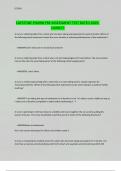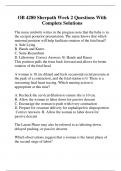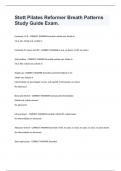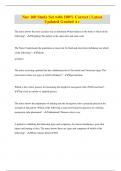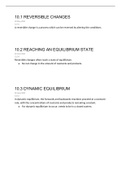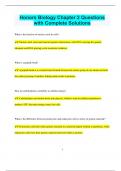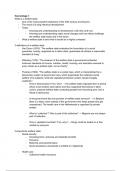Corporate Sustainability and Change
Management
Important dates:
- Wednesday 22nd of December: Coroporate Sustainability Assessment
- Friday 12th of January: Refelction Report
- Monday 22nd January: Digital Exam – Open book
- Wednesday 24th January: Final Presentation
- Friday 26th January: Implementation Plan
Table of Contents
Important dates: .............................................................................................................. 1
Lecture 1 Introduction....................................................................................................... 4
1) Johannes Meuer, Koelbel, J. Hoffmann, V.K. (200820). On the Nature of Corporate
Sustainability Organization & Environment. 33(3), 319-341. ...................................................... 4
Lecture 2 Organizational Change and Sustainability .......................................................... 7
2) Jones, G. R. (2013). Organizational theory, design, and change. Upper Saddle River: Pearson.
Page 295;296; 303-305; 307; 312-316. ....................................................................................... 7
3) Maon, F., Lindgreen, A., & Swaen, V. (2009). Designing and implementing corporate social
responsibility: An integrative framework grounded in theory and practice. Journal of business
ethics, 87(1), 71-89................................................................................................................... 9
Lecture 3 Stakeholder management & Tutorial 1 Stakeholder Engagement ..................... 11
4) Lozano, R. (2015). A holistic perspective on corporate sustainability drivers. Corporate Social
Responsibility and Environmental Management 22(1), 32-44. ................................................. 11
5) Greenwood, M. (2007). Stakeholder Engagement: Beyond the Myth of Corporate
Responsibility. Journal of Business Ethics, 74(4), 315-327. ....................................................... 13
6) van Huijstee, M. & Glasbergen, P. (2010). NGOs moving business: An analysis of contrasting
strategies. Business & Society, 49(4), 591-618. ........................................................................ 15
Lecture 4 Sustainable Business Strategies & Tutorial 2 Strategy Creation ......................... 16
7) Baumgartner, R. J. & Edler, D. (2010). Corporate sustainability strategies: sustainability
profiles and maturity levels, Sustainable Development, 18, 76–89 ........................................... 16
8) Hahn, Figge, F., Pinkse, J., & Preuss, L. (2010). Trade-offs in corporate sustainability: you can’t
have your cake and eat it. Business Strategy and the Environment, 19(4), 217–229. ................. 20
Lecture 5 Leadership and Implementing Sustainability within firms & Tutorial 3 Resistance
to change ....................................................................................................................... 23
1
, 9) Benn, S., Dunphy D. and Griffiths A. (2014) Organizational Change for Corporate
Sustainability. New York: Routledge, 3rd edition. Chapter 9 Leading towards sustainability (page
287-322). ............................................................................................................................... 23
10) Jones, G. R. (2013). Organizational theory, design, and change. Upper Saddle River: Pearson.
Page 317-321. ........................................................................................................................ 26
11) White, P. (2009). Building a sustainability strategy into the business. Corporate Governance:
The International Journal of Business in Society, 9(4), 386-394 ................................................ 27
12) Bovey, W.H. and A. Hede. (2001). Resistance to Organizational Change: The Role of Cognitive
and Affective Processes. Leadership & Organization Development Journal 22(8) 372-382 ......... 30
13) Burnes, B. (2015). Understanding resistance to change—Building on Coch and French.
Journal of Change Management, 15(2), pp.92–116. ................................................................. 33
14) Jones, G. R. (2013). Organizational theory, design, and change. Upper Saddle River: Pearson.
Page 300-302 ......................................................................................................................... 36
Lecture 6 Sustainable Supply Chain Management & Tutorial 4 Implementing External
Assurance ....................................................................................................................... 38
15) Beske, P., & Seuring, S. (2014). Putting sustainability into supply chain management. Supply
Chain Management: An International Journal, 19, 322–331. .................................................... 38
16) Villena, V. H., & Gioia, D. A. (2020). A more sustainable supply chain. Harvard Business
Review, March-April 2020....................................................................................................... 42
Lecture 7 Sustainability Reporting & Tutorial 5 (shareholder engagement) ...................... 44
17) United Nations Environment Programme (2019). Background to Sustainability Reporting -
Enhancing the Uptake and Impact of Corporate Sustainability Reporting: A Handbook and
Toolkit for Policymakers and Relevant Stakeholders Section A - Handbook............................... 44
18) Pucker, K.P. (2021). Overselling Sustainability Reporting. Harvard Business Review, May-June
2021. ..................................................................................................................................... 52
Lectures
Lecture 1: Introduction 13-11-2023 ................................................................................. 55
Lecture 2: Organizational Change and Sustainability 15-11-2023 ..................................... 58
Organizational Change: what are we talking about? ................................................................ 58
Types of change ..................................................................................................................... 59
Models of change................................................................................................................... 59
Summary models .......................................................................................................................... 63
Organizational change and sustainability ................................................................................ 63
Lecture 3: Stakeholder management 20-11-2023............................................................. 65
Drivers to corporate sustainability .......................................................................................... 65
Stakeholder theory (Edward Freeman).................................................................................... 65
Identifying the stakeholders.......................................................................................................... 66
Determining the stakes ................................................................................................................. 67
Stakeholder engagement and corporate sustainability ................................................................ 68
Stakeholders’ strategies ......................................................................................................... 70
2
,Guest Lecture: Publyon stakeholder management ........................................................... 72
Lecture 4: Sustainable Business Strategies 27-11-2023 .................................................... 76
Business Strategy and Corporate Sustainability ....................................................................... 76
Corporate Sustainability Strategies ......................................................................................... 78
Trade-offs in CSR .................................................................................................................... 81
Lecture 5: Leadership and implementing sustainability within firms 04-12-2023 .............. 83
Goal-setting process & KPIs .................................................................................................... 83
Integrating a sustainability strategy into the business.............................................................. 85
Leading change and strategies to promote change and overcome resistance ............................ 86
Organizational development techniques ................................................................................. 88
Lecture 6: Sustainable supply chain management 13-12-2023 ......................................... 90
Integrating sustainability across the supply chain .................................................................... 90
Guest lecture: G-Star Raw, Environmental supply chain management ............................. 95
Lecture 7: Sustainability reporting 08-01-2024 .............................................................. 101
Financial disclosure and the limitations of annual reports ..................................................... 101
Sustainability reporting ........................................................................................................ 101
Reporting and communicating .............................................................................................. 104
Guest lecture: Corporate Sustainability Reporting ......................................................... 104
3
, Lecture 1 Introduction
1) Johannes Meuer, Koelbel, J. Hoffmann, V.K. (200820). On the Nature of Corporate
Sustainability Organization & Environment. 33(3), 319-341.
Corporate sustainability important goal for:
- Managers → across all industries
- Policy makers → addressing global challenges, e.g. climate change and poverty
- Academic publications
- Management & practitioner journals
Four essential attributes of corporate sustainability (Table 2 & Table 3):
1. Genus: family of objects to which corporate sustainability belongs
a. E.g. practice, concept or paradigm
b. E.g. wine glass belong to the family of glasses
2. (Three) Differentiae: those components that set the object apart from other species
of the same family
a. specificity of sustainable development
b. the level of ambition
c. the level of integration
i. E.g. wine sets the wine glass apart from other glasses
=> allow us to develop a conceptual space that → corporate sustainability cube
- cube facilitates communication among researches and managers involved in
corporate sustainability and thereby helps identify means for firms to effectively
contribute to sustainable development.
Corporate sustainability emphasizes the embeddedness of firms in larger systems, and their
roles in stabilizing or eroding these systems.
- Contrasts with corporate social responsibility (CSR) emphasizes the moral
responsibilities of firms and the norms guiding business behavior.
=> often circumscribe the same concrete actions, research on corporate sustainability stems
from a different perspective, namely that firms contribute to outcomes at the level of the
systems in which they are nested.
4
Management
Important dates:
- Wednesday 22nd of December: Coroporate Sustainability Assessment
- Friday 12th of January: Refelction Report
- Monday 22nd January: Digital Exam – Open book
- Wednesday 24th January: Final Presentation
- Friday 26th January: Implementation Plan
Table of Contents
Important dates: .............................................................................................................. 1
Lecture 1 Introduction....................................................................................................... 4
1) Johannes Meuer, Koelbel, J. Hoffmann, V.K. (200820). On the Nature of Corporate
Sustainability Organization & Environment. 33(3), 319-341. ...................................................... 4
Lecture 2 Organizational Change and Sustainability .......................................................... 7
2) Jones, G. R. (2013). Organizational theory, design, and change. Upper Saddle River: Pearson.
Page 295;296; 303-305; 307; 312-316. ....................................................................................... 7
3) Maon, F., Lindgreen, A., & Swaen, V. (2009). Designing and implementing corporate social
responsibility: An integrative framework grounded in theory and practice. Journal of business
ethics, 87(1), 71-89................................................................................................................... 9
Lecture 3 Stakeholder management & Tutorial 1 Stakeholder Engagement ..................... 11
4) Lozano, R. (2015). A holistic perspective on corporate sustainability drivers. Corporate Social
Responsibility and Environmental Management 22(1), 32-44. ................................................. 11
5) Greenwood, M. (2007). Stakeholder Engagement: Beyond the Myth of Corporate
Responsibility. Journal of Business Ethics, 74(4), 315-327. ....................................................... 13
6) van Huijstee, M. & Glasbergen, P. (2010). NGOs moving business: An analysis of contrasting
strategies. Business & Society, 49(4), 591-618. ........................................................................ 15
Lecture 4 Sustainable Business Strategies & Tutorial 2 Strategy Creation ......................... 16
7) Baumgartner, R. J. & Edler, D. (2010). Corporate sustainability strategies: sustainability
profiles and maturity levels, Sustainable Development, 18, 76–89 ........................................... 16
8) Hahn, Figge, F., Pinkse, J., & Preuss, L. (2010). Trade-offs in corporate sustainability: you can’t
have your cake and eat it. Business Strategy and the Environment, 19(4), 217–229. ................. 20
Lecture 5 Leadership and Implementing Sustainability within firms & Tutorial 3 Resistance
to change ....................................................................................................................... 23
1
, 9) Benn, S., Dunphy D. and Griffiths A. (2014) Organizational Change for Corporate
Sustainability. New York: Routledge, 3rd edition. Chapter 9 Leading towards sustainability (page
287-322). ............................................................................................................................... 23
10) Jones, G. R. (2013). Organizational theory, design, and change. Upper Saddle River: Pearson.
Page 317-321. ........................................................................................................................ 26
11) White, P. (2009). Building a sustainability strategy into the business. Corporate Governance:
The International Journal of Business in Society, 9(4), 386-394 ................................................ 27
12) Bovey, W.H. and A. Hede. (2001). Resistance to Organizational Change: The Role of Cognitive
and Affective Processes. Leadership & Organization Development Journal 22(8) 372-382 ......... 30
13) Burnes, B. (2015). Understanding resistance to change—Building on Coch and French.
Journal of Change Management, 15(2), pp.92–116. ................................................................. 33
14) Jones, G. R. (2013). Organizational theory, design, and change. Upper Saddle River: Pearson.
Page 300-302 ......................................................................................................................... 36
Lecture 6 Sustainable Supply Chain Management & Tutorial 4 Implementing External
Assurance ....................................................................................................................... 38
15) Beske, P., & Seuring, S. (2014). Putting sustainability into supply chain management. Supply
Chain Management: An International Journal, 19, 322–331. .................................................... 38
16) Villena, V. H., & Gioia, D. A. (2020). A more sustainable supply chain. Harvard Business
Review, March-April 2020....................................................................................................... 42
Lecture 7 Sustainability Reporting & Tutorial 5 (shareholder engagement) ...................... 44
17) United Nations Environment Programme (2019). Background to Sustainability Reporting -
Enhancing the Uptake and Impact of Corporate Sustainability Reporting: A Handbook and
Toolkit for Policymakers and Relevant Stakeholders Section A - Handbook............................... 44
18) Pucker, K.P. (2021). Overselling Sustainability Reporting. Harvard Business Review, May-June
2021. ..................................................................................................................................... 52
Lectures
Lecture 1: Introduction 13-11-2023 ................................................................................. 55
Lecture 2: Organizational Change and Sustainability 15-11-2023 ..................................... 58
Organizational Change: what are we talking about? ................................................................ 58
Types of change ..................................................................................................................... 59
Models of change................................................................................................................... 59
Summary models .......................................................................................................................... 63
Organizational change and sustainability ................................................................................ 63
Lecture 3: Stakeholder management 20-11-2023............................................................. 65
Drivers to corporate sustainability .......................................................................................... 65
Stakeholder theory (Edward Freeman).................................................................................... 65
Identifying the stakeholders.......................................................................................................... 66
Determining the stakes ................................................................................................................. 67
Stakeholder engagement and corporate sustainability ................................................................ 68
Stakeholders’ strategies ......................................................................................................... 70
2
,Guest Lecture: Publyon stakeholder management ........................................................... 72
Lecture 4: Sustainable Business Strategies 27-11-2023 .................................................... 76
Business Strategy and Corporate Sustainability ....................................................................... 76
Corporate Sustainability Strategies ......................................................................................... 78
Trade-offs in CSR .................................................................................................................... 81
Lecture 5: Leadership and implementing sustainability within firms 04-12-2023 .............. 83
Goal-setting process & KPIs .................................................................................................... 83
Integrating a sustainability strategy into the business.............................................................. 85
Leading change and strategies to promote change and overcome resistance ............................ 86
Organizational development techniques ................................................................................. 88
Lecture 6: Sustainable supply chain management 13-12-2023 ......................................... 90
Integrating sustainability across the supply chain .................................................................... 90
Guest lecture: G-Star Raw, Environmental supply chain management ............................. 95
Lecture 7: Sustainability reporting 08-01-2024 .............................................................. 101
Financial disclosure and the limitations of annual reports ..................................................... 101
Sustainability reporting ........................................................................................................ 101
Reporting and communicating .............................................................................................. 104
Guest lecture: Corporate Sustainability Reporting ......................................................... 104
3
, Lecture 1 Introduction
1) Johannes Meuer, Koelbel, J. Hoffmann, V.K. (200820). On the Nature of Corporate
Sustainability Organization & Environment. 33(3), 319-341.
Corporate sustainability important goal for:
- Managers → across all industries
- Policy makers → addressing global challenges, e.g. climate change and poverty
- Academic publications
- Management & practitioner journals
Four essential attributes of corporate sustainability (Table 2 & Table 3):
1. Genus: family of objects to which corporate sustainability belongs
a. E.g. practice, concept or paradigm
b. E.g. wine glass belong to the family of glasses
2. (Three) Differentiae: those components that set the object apart from other species
of the same family
a. specificity of sustainable development
b. the level of ambition
c. the level of integration
i. E.g. wine sets the wine glass apart from other glasses
=> allow us to develop a conceptual space that → corporate sustainability cube
- cube facilitates communication among researches and managers involved in
corporate sustainability and thereby helps identify means for firms to effectively
contribute to sustainable development.
Corporate sustainability emphasizes the embeddedness of firms in larger systems, and their
roles in stabilizing or eroding these systems.
- Contrasts with corporate social responsibility (CSR) emphasizes the moral
responsibilities of firms and the norms guiding business behavior.
=> often circumscribe the same concrete actions, research on corporate sustainability stems
from a different perspective, namely that firms contribute to outcomes at the level of the
systems in which they are nested.
4


